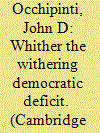|
|
|
Sort Order |
|
|
|
Items / Page
|
|
|
|
|
|
|
| Srl | Item |
| 1 |
ID:
130992


|
|
|
|
|
| Publication |
2014.
|
| Summary/Abstract |
How to Engage with the Politics of Privacy in the Age of Preemptive Security? My suggestion is to start with data protection, which, following De Hert and Gutwirth (2006), is not exactly the same of privacy. Extrapolating from their analysis of the two as different "legal tools," I would say that privacy and data protection are two slightly different rationales of power relations: one of privacy based on the "opacity of the individual" and one of data protection on the "transparency and accountability of the powerful" (Gutwirth and De Hert 2008:275; emphasis in original).1 These rationales (attempt to) orientate two different loose dispositifs, each formed by a composite ensemble of elements. Some of these elements are peculiar to each dispositif, while others are shared or encompassed by both
|
|
|
|
|
|
|
|
|
|
|
|
|
|
|
|
| 2 |
ID:
129577


|
|
|
|
|
| Publication |
2014.
|
| Summary/Abstract |
Following several months of uncertainty in the wake of the rejection of the treaty establishing a constitution for Europe, the Lisbon Treaty eventually entered into force in December 2009. Although it fell short of establishing a constitution for the European Union (EU), it introduced several noteworthy changes, notably for EU internal security policies, also known as the 'Area of Freedom, Security and Justice' (AFSJ). This special section considers how various dimensions of the AFSJ have been affected by the Lisbon Treaty and the gradual reinforcement of supranational governance that it has generated in this key policy area. Over the past decade, the AFSJ has experienced tremendous development, making it one of the most dynamics areas of European integration. The AFSJ is a broad and heterogeneous policy domain, which includes asylum, immigration and border policies, counter-terrorism, justice and police cooperation, as well as the external dimension of these activities. Given the crucial importance of current internal security threats, such as terrorism, and the sensitivities surrounding policy responses to them, it is necessary to take stock of how far the EU has progressed toward its goals of an AFSJ and how this has been influenced by the most recent treaty changes. To accomplish this goal, this special section brings together some of the most distinguished scholars in the field and several younger scholars conducting cutting-edge research on the AFSJ.
|
|
|
|
|
|
|
|
|
|
|
|
|
|
|
|
| 3 |
ID:
129580


|
|
|
|
|
| Publication |
2014.
|
| Summary/Abstract |
This article examines how the Lisbon Treaty's changes to the European Union's (EU's) Area of Freedom, Security and Justice (AFSJ) have affected its 'democratic deficit'. How this issue is perceived depends on one's conceptual understanding of democratic legitimacy. This article reviews key scholarly perspectives on this matter and organizes these according to Schmidt's concepts of 'inputs', 'throughputs' and 'outputs'. The article then applies this framework to specific innovations of the Lisbon Treaty, including new roles for the European Parliament and Court of Justice in the AFSJ. The article concludes that the EU's latest treaty has improved its democratic deficit in some regards, but that many issues of democratic legitimacy remain.
|
|
|
|
|
|
|
|
|
|
|
|
|
|
|
|
|
|
|
|
|